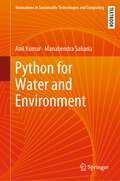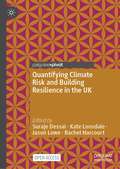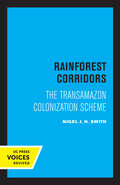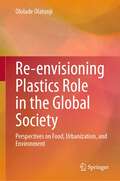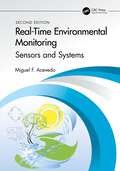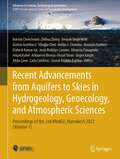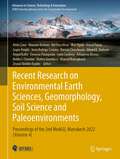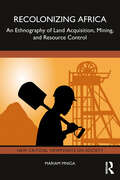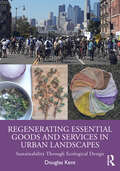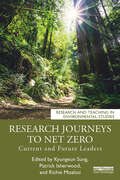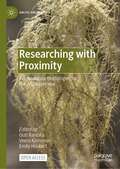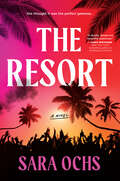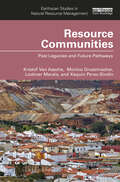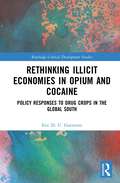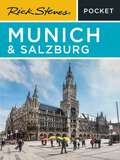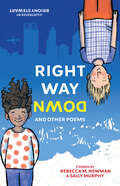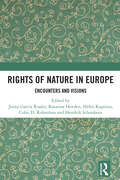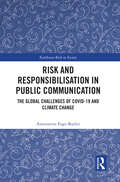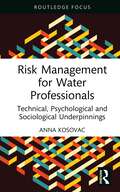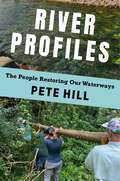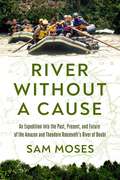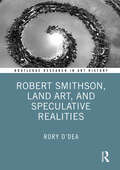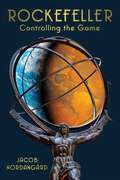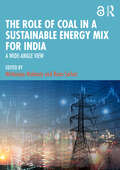- Table View
- List View
Python for Water and Environment (Innovations in Sustainable Technologies and Computing)
by Anil Kumar Manabendra SahariaThis textbook delves into the practical applications of surface and groundwater hydrology, as well as the environment. The Part I, "Practical Python for a Water and Environment Professional," guides readers through setting up a scientific computing environment and conducting exploratory data analysis and visualization using reproducible workflows. The Part II, "Statistical Modeling in Hydrology," covers regression models, time series analysis, and common hypothesis testing. The Part III, "Surface and Subsurface Water," illustrates the use of Python in understanding key concepts related to seepage, groundwater, and surface water flows. Lastly, the Part IV, "Environmental Applications," demonstrates the application of Python in the study of various contaminant transport phenomena.
Quantifying Climate Risk and Building Resilience in the UK
by Suraje Dessai Kate Lonsdale Jason Lowe Rachel HarcourtThis open access book draws together key research from the UK Climate Resilience programme. It focuses on topics central to the programme’s research agenda, including improved characterisation and quantification of climate risks, enhanced understanding of the management of climate risks, and the development and delivery of climate services. Key chapters address the challenges inherent to undertaking resilience research, including how to make the term ‘climate resilience’ usable and useful, co-producing research between academics, policy makers and practitioners, and engaging and communicating outside of academia. This book is unique in providing a concise and accessible overview of the programme’s key lessons, placing the findings into a wider context and it will inform future research, policy and practice agendas.
Rainforest Corridors: The Transamazon Colonization Scheme
by Nigel J. SmithThis title is part of UC Press's Voices Revived program, which commemorates University of California Press’s mission to seek out and cultivate the brightest minds and give them voice, reach, and impact. Drawing on a backlist dating to 1893, Voices Revived makes high-quality, peer-reviewed scholarship accessible once again using print-on-demand technology. This title was originally published in 1982.
Re-envisioning Plastics Role in the Global Society: Perspectives on Food, Urbanization, and Environment
by Ololade OlatunjiThis book covers the challenges and opportunities presented by plastics in the modern era and sheds light on the complex interplay of technology, environment, and socio-economic dynamics. With a thorough exploration of the history, uses, and potential of plastics, the book reviews the impact of plastics beyond single-use plastics, and critiques multiple long-term plastic applications that are significant for food security, water resource management, ecological conservation/restoration, and sustainable urbanization. It also explores frameworks for achieving a more sustainable plastic economy aligned with sustainable development goals. This book comprises 13 chapters, commencing with a critical assessment of plastics in the context of sustainable development and global society. It proceeds with a historical overview of plastics' evolution, showcasing pivotal milestones and innovations in modern industry and daily life. Subsequent chapters delve into diverse topics: the intricate relationships between plastics, food security, and sustainable urbanization; plastics' impact on water safety, management, distribution, and conservation; their potential as an alternative energy source; and their innovative applications in sustainable transportation and energy generation. Emphasis is placed on plastics' role in waste reduction and recycling, as well as the latest sustainable alternatives like biodegradable and recyclable materials. In the book's final sections, readers will learn about green buildings and climate-resilient cities constructed using innovative plastic materials, and plastics' significance in space exploration. The book concludes with a forward-looking perspective on plastics' future, accompanied by recommendations for a more sustainable coexistence between society and these versatile materials. This book is a valuable resource for researchers, policymakers, industry professionals, and concerned citizens seeking to navigate the intricate landscape of plastics, their environmental implications, and their potential for sustainable development.
Real-Time Environmental Monitoring: Sensors and Systems - Textbook
by Miguel F. AcevedoWritten 10 years after the publication of the first edition, this updated edition of Real-Time Environmental Monitoring: Sensors and Systems introduces the fundamentals of environmental monitoring based on electronic sensors, instruments, systems, and software that allow continuous and long-term ecological and environmental data collection. It accomplishes two objectives: explains how to use sensors for building more complex instruments, systems, and databases, and introduces a variety of sensors and systems employed to measure environmental variables in air, water, soils, vegetation canopies, and wildlife observation and tracking. This second edition is thoroughly updated in every aspect of technology and data, and each theoretical chapter is taught parallel with a hands-on application lab manual. Emphasizes real-time monitoring as an emerging area for environmental assessment and compliance and covers the fundamentals on how to develop sensors and systems Presents several entirely new topics not featured in the first edition, including remote sensing and GIS, machine learning, weather radar and satellites, groundwater monitoring, spatial analysis, and habitat monitoring Includes applications to many environmental and ecological systems Uses a practical, hands-on approach with the addition of an accompanying lab manual, which students can use to deepen their understanding, based on the author’s 40 years of academic experience Intended for upper-level undergraduate and graduate students, taking courses in civil and environmental engineering, electrical engineering, mechanical engineering, geosciences, and environmental sciences, as well as professionals working in environmental services, and researchers and academics in engineering.
Recent Advancements from Aquifers to Skies in Hydrogeology, Geoecology, and Atmospheric Sciences: Proceedings of the 2nd MedGU, Marrakesh 2022 (Volume 1) (Advances in Science, Technology & Innovation)
by Haroun Chenchouni Zhihua Zhang Deepak Singh Bisht Matteo Gentilucci Mingjie Chen Helder I. Chaminé Maurizio Barbieri Mahesh Kumar Jat Jesús Rodrigo-Comino Dionysia Panagoulia Amjad Kallel Arkoprovo Biswas Veysel Turan Jasper Knight Attila Çiner Carla Candeias Zeynal Abiddin ErgülerThis book is based on the accepted papers for presentation at the 2nd MedGU Annual Meeting, Marrakesh 2022. It presents a series of newest research studies that are nowadays relevant mainly to Middle East, Mediterranean region, and Africa. It includes major subjects related to hydrology, hydrogeology, hydrogeochemistry including, but not limited to, isotope hydrology, groundwater models, water resources and systems, and related subjects. It also includes research studies on biogeochemistry which mainly focus on the interactions between life and the chemical cycles in the Earth system. Some case studies on geobiology and geoecology investigate the structure and function of geoecosystems, their components, and their environment. The book also presents major subjects related to atmospheric, oceanic, meteorology and climatic science with recent developments in the field. By cutting across these traditional subject boundaries, this book brings together the major elements that are important for understanding the weather, climate, water systems, and geoecosystems in these regions.
Recent Research on Environmental Earth Sciences, Geomorphology, Soil Science and Paleoenvironments: Proceedings of the 2nd MedGU, Marrakesh 2022 (Volume 4) (Advances in Science, Technology & Innovation)
by Attila Çiner Maurizio Barbieri Md Firoz Khan Ilker Ugulu Veysel Turan Jasper Knight Jesús Rodrigo-Comino Haroun Chenchouni Ahmed E. Radwan Amjad Kallel Dionysia Panagoulia Carla Candeias Arkoprovo Biswas Helder I. Chaminé Matteo Gentilucci Mourad Bezzeghoud Zeynal Abiddin ErgülerThis book is based on the accepted papers for presentation at the 2nd MedGU Annual Meeting, Marrakesh 2022. The book presents a series of newest research studies that are nowadays relevant to Middle East, Mediterranean region, Africa, and surrounding areas. The book gives a general overview on current research, focusing on geoenvironmental issues and challenges in environmental management in these regions. It offers a broad range of recent studies that discuss the latest advances in geography, geomorphology, landslides, and soil science, in addition to geoarchaeology and geoheritage. It also shares insights on some glaciology studies. The book also enhances the understanding of paleoclimate and paleoenvironmental changes based on research studies from the fields of marine geosciences, historical geology, and paleoceanography and paleoclimatology.
Recolonizing Africa: An Ethnography of Land Acquisition, Mining, and Resource Control (New Critical Viewpoints on Society)
by Mariam MnigaExplaining how the legacy of colonialism and the nature of the liberal economy play a significant role in the development of Africa today, keeping Africa poor and dependent, this book explains how trade liberalization, deregulation, and privatization had opened doors for the New Scramble for Africa.Green technology and the high demand for electronics have intensified Africa’s role as a supplier of raw materials, natural resources, and cheap labor and as a large market of more than one billion people in the global economy. This unique ethnographic study, with elements of autoethnography, starts with the author's journey to Bulyanhulu, Tanzania, one of the largest gold mines in Africa, and moves to a broader analysis that reveals the systemic violence of resource extraction. Focus groups, interviews, and observations demonstrate the lack of distributive justice and intersectional equality in the process of land acquisition and resource extraction, described by villagers in racialized and gendered terms as exploitative and part of a racist system that fails to provide a fair distribution of benefits to local people.Recolonizing Africa examines resource conflicts among local people, governments, and transnational corporations from Europe, North America, and Asia, revealing how global systemic violence and irresponsible business practices precipitate economic inequality between African and financially rich nations – threatening peace and security, indigenous rights, and the environment.
Regenerating Essential Goods and Services in Urban Landscapes: Sustainability Through Ecological Design
by Douglas KentHow do we provide for and nurture millions of people without destroying the planet in the process? Author Doug Kent, an environmental specialist, believes a vital element in the solution is recognizing that urban landscapes are an essential partner in everyone’s wellbeing. He argues that urban landscapes can and must work harder.Urban landscapes can provide part of our energy needs, help cool our buildings and public spaces, help us make the most of our precious water. They can also help combat air pollution and reduce the likelihood of allergies and asthma. They can provide landscape materials and even contribute to our timber supply. Doug also advocates turning landscapes into a food source, and/or a perfumery, pharmacy, soap shop, or craft store.Doug has over 12 years of research in this book. He has spent years doing literature reviews, and many more years concocting, consuming, crafting, distilling, propagating, retting, sawing, sowing, and weaving its many recommendations. He has also travelled the length and width of California many times to interview the people and businesses already doing this incredible work.Regenerating Essential Goods and Services is not a manifesto. It is a user’s manual. You are the creative and energetic force that will ultimately drive sustainability and regeneration. Let’s go.
Research Journeys to Net Zero: Current and Future Leaders (Research and Teaching in Environmental Studies)
by Kyungeun Sung Patrick Isherwood Richie MoalosiThis book provides useful insight into how academics from diverse disciplinary backgrounds, such as science, engineering, technology, social science, policy, design, architecture, built environment, business, and management, have been conducting research into how to realise net zero emissions to address climate change. This book explores the ways in which countries around the world have pledged to achieve net zero emissions through decarbonisation processes. It presents the highest calibre research and impact activities carried out in the UK, Europe, North America, Australia, Asia, and Africa. Such activities include conceptualisation, opportunity identification, specific case studies, demonstration of proof of concepts, provision of evidence, education of the general public, and knowledge transfer to companies. Further to this, the chapters also bring to light personal career journeys to net zero by current and future international research leaders. From this book, readers will gain a full understanding of net zero research via multiple disciplinary pathways, be inspired by personal accounts, and will learn key methodologies, including quantitative and qualitative approaches. The diversity of authors and topics make the book widely applicable to a range of fields, and it will be of great interest to researchers, students, practitioners, and decision makers working towards the goals of net zero and decarbonisation.
Researching with Proximity: Relational methodologies for the Anthropocene (Arctic Encounters)
by Outi Rantala Veera Kinnunen Emily HöckertThis open access book presents a series of speculative, experimental modes of inquiry in the present times of environmental damage that have come to be known as the age of the Anthropocene. Throughout the book authors develop more nuanced ways of engaging with the environmentally vulnerable Arctic. They counter distancing, exoticising, and even apocalyptic imaginaries of the Arctic by staying proximate with mundane places and beings of the north. The volume engages and plays with familiar tourism concepts, such as hospitality, visiting, difference, care, openness, and distance, while expanding the focus from binary and human-centric approaches of hosts and guests to questions of wellbeing among multispecies communities. The transdisciplinary group of contributors share a curiosity about how staying proximate may provide theoretical depth and epistemological openings to attend to current tensions and to diversify the ways we do and enact research. Thus, each chapter provides a methodological experiment with proximity, developing diverse ways of envisioning and storying more-than-human worlds.
The Resort: A Novel
by Sara Ochs"A deadly, dangerous, beautiful nightmare." — Chris Whitaker, New York Times bestselling author of We Begin at the EndFor readers of Rachel Hawkins and We Were Never Here comes a searing vacation thriller set on a remote island in Thailand following two mysterious women, a charismatic group of expats, and the one murder poised to bring their paradise crashing down.Welcome to paradise. We hope you survive your stay...There are three rules to follow during a vacation at the famous Koh Sang Resort1 – Leave the past behind.When Cass sets foot on the coast of Thailand's world-famous party island, she's searching for an escape. With dark secrets following her every move, Koh Sang becomes the perfect place to hide.2 - Always be careful of who you trust.Now, years later, Cass is a local dive instructor alongside the Permanents, a group of expats who have claimed the island as their own. The Permanents don't linger on who they were before the island. Simply because, like Cass, they all have something to outrun.3 – If someone discovers who you really are, run.But suddenly, a dive student is found dead and paradise comes crashing down. Because this isn't the first mysterious death on the island, and it won't be the last. Someone knows who Cass is and they're ready to make sure justice is finally served.
Resource Communities: Past Legacies and Future Pathways (Earthscan Studies in Natural Resource Management)
by Kristof Van Assche Monica Gruezmacher Lochner Marais Xaquin Perez-SindinThis book provides an innovative approach to understanding the governance of resource communities, by showcasing how the past and present informs the future. Resource communities have complicated relationships with the past, and this makes their relationship with the future, and the future itself, also complicated. The book digs deeply into the myriad legacies left by a history of resource extraction in a community and makes use of interdisciplinary and transdisciplinary perspectives to understand the complex issues being faced by a range of different communities that are reliant on different types of resources across the world. From coal and gold mining, to fishing towns and logging communities, the book explores the legacies of boom and bust economies, social memory, trauma and identity, the interactions between power and knowledge and the implications for adaptive governance. Balancing conceptual and theoretical understandings with empirical and practical knowledge of resource communities, natural resource use and social-ecological relationships, the book argues that solutions for individual communities need to be embraced in the community and not just in the perspectives of visiting experts. Linking the past, present and futures of resource communities in a new way, the book concludes by providing practical recommendations for breaking open dependencies on the past, including deepening awareness of the social, economic and environmental contexts, establishing strong governance and developing community strategies, plans and policies for the future. This book will be of great interest to students and scholars of natural resource governance and management, extractive industries, environmental policy, community planning and development, environmental geography and sustainable development, as well as policymakers involved in supporting community development in natural resource-dependent communities across the world.
Rethinking Illicit Economies in Opium and Cocaine: Policy Responses to Drug Crops in the Global South (Routledge Critical Development Studies)
by Eric D. GutierrezThis book investigates the cross-border trade in illicit drug crops in the global south. It exposes an important paradox: despite all the dangers and negative consequences of these criminal networks, in many cases, they also provide marginalised and excluded communities with important private sources of protection, investment, and employment. This book reconstructs and compares socioeconomic contexts, criminal careers, and changes in farmgate prices of illicit coca and opium poppy crops in Afghanistan, Myanmar, Colombia, and Bolivia. It investigates the politics of strange bedfellows; informal bankers-without-suits providing cross-border financial services to the undocumented and the unbanked; the criminals without borders; and the mystery of illicit crop prices. The book challenges commonly held assumptions and casts new light on how relationships of conflict and accommodation are arranged and re-arranged in fluid, ever-changing contexts, producing often paradoxical outcomes. It then suggests policy reforms and alternative approaches to drug policy, development aid, and peacebuilding work. Researchers and students across development, peacebuilding, illicit economies, and conflict studies will find this book an important source of original research and analysis. It will also be useful for politicians, commentators and public officials considering what to do differently in tackling illicit drug economies.
Rick Steves Pocket Munich & Salzburg (Rick Steves Pocket)
by Rick StevesMake the most of every day and every dollar with Rick Steves! This colorful, compact guidebook is perfect for spending a week or less in Munich and Salzburg: City walks and tours: Five detailed self-guided walks including a Munich city walk, Nymphenburg Palace tour, Sound of Music tour, and more Rick's strategic advice on what's worth your time and money What to eat and where to stay: Savor Bratwurst from a streetside Würstelstand, mingle with locals at a beer hall, and stay at a traditional Bavarian bed-and-breakfast Day-by-day itineraries to help you prioritize your time A detailed, detachable fold-out map, plus museum and city maps throughout Full-color, portable, and slim for exploring on-the-goTrip-planning practicalities like when to go, how to get around, basic German phrases, and more Lightweight, yet packed with info on the cities' history and culture, Rick Steves Pocket Munich & Salzburg truly is a tour guide in your pocket. Extending your trip? Try Rick Steves Best of Germany.
Ride Beside Me
by Lucy KnisleyThe community that rides together, thrives together! New York Times bestselling comic creator Lucy Knisley celebrates the joys of biking in this picture book about coming together to build safer streets and a brighter future for all.A mother and son hop on their bike for a ride through the neighborhood, joining friends and neighbors along the way. There are people on unicycles and tandem bikes, tricycles and recumbents—all kinds of bikes for all kinds of riders.Before long, the bikes outnumber the cars and trucks, taking up more and more of the road until they form a parade of sorts, smiling and popping wheelies, ringing their bells, and celebrating the beautiful community they all share.
Right Way Down: A middle-reader poetry collection
by Sally MurphyStand on your head with Sally Murphy, explode some dynamite with Cristy Burne or shoot some hoops with Cheryl Kickett-Tucker. Grow a poettree with Meg McKinlay or curl up next to your cat with Amber Moffat and watch a bit of Stink-o-Vision with James Foley. These and loads more poems by Australian poets are there to discover in Right Way Down. With striking illustrations by Briony Stewart, these poems will have you laughing, thinking, and playing with words – whichever way you read them.
Rights of Nature in Europe: Encounters and Visions
by Jenny García Ruales Katarina Hovden Helen Kopnina Colin D. Robertson Hendrik SchoukensThis book addresses the recognition of the Rights of Nature (RoN) in Europe, examining their conceptualisation and implementation. RoN refers to a diverse set of legal developments that seek to redefine Nature's status within the law, gradually emerging as a novel template for environmental protection. Countries like Ecuador and New Zealand, each with distinct histories and ways of dwelling in the world, have pioneered a new era in environmental governance by legally acknowledging rights or personhood for nature, ecosystems, and more-than-human populations.In recent years, Europe has witnessed growing interest in RoN, with academic, legislative, and political initiatives gaining momentum. A significant development is the September 2022 passage of a law in the Spanish Parliament, granting legal personhood and rights to the Mar Menor, a saltwater lagoon severely affected by environmental degradation.Given the diversity in interpretations and articulations of ‘Rights of Nature’, this edited volume argues that their arrival in Europe fosters different kinds of interactions across distinct areas of law, knowledge, practices, and societal domains. The book employs a multidisciplinary approach, exploring these interactions in law and policy, anthropology, Indigenous worldviews and jurisprudence, philosophy, spiritual traditions, critical theory, animal communication, psychology, and social work.This book is tailored for scholars in law, political science, environmental studies, anthropology and cultural studies; as well as legal practitioners, NGOs, activists and policy-makers interested in ecology and environmental protection.
Risk and Responsibilisation in Public Communication: The Global Challenges of COVID-19 and Climate Change (Earthscan Risk in Society)
by Antoinette Fage-ButlerThis book explores the connections between risk and responsibilisation in official communication to the public about the global risks of the pandemic and climate change. Our media spheres in the 2020s have been saturated with information about what we should or should not be doing to meet the challenges of the COVID-19 pandemic and climate change. Although the ability of risk communication to ‘responsibilise’ the public is central to its functioning in our societies, this aspect has so far been under-investigated in academia. To address this lacuna, Antoinette Fage-Butler develops a discursive approach to risk communication that focuses on the values that are communicated in risk messages. Examples of official risk communication about the pandemic and climate change from national and transnational contexts are analysed and compared, leading to new empirical findings and theoretical insights about the nature of risk and responsibilisation. Fage-Butler also builds on recent stirrings in the evolving field of risk communication that highlight the importance of cultural and value-related factors. Overall, this book will equip researchers with an approach to risk communication that reflects the complexity of today’s global risk challenges. Risk and Responsibilisation in Public Communication will be of great interest to students and scholars of risk communication, public health and environmental studies.
Risk Management for Water Professionals: Technical, Psychological and Sociological Underpinnings (Routledge Focus on Environment and Sustainability)
by Anna KosovacThis book presents a comprehensive view of the different theories of risk management in water, drawing on recent studies that serve to inform the way that practitioners consider their own risk practice.While it is commonplace to see risk described in technical and engineering terms when discussing water, this book argues that this is a flawed practice that results in poor decision-making, particularly where water intersects with social elements and the community. Challenging these traditionally held notions of risk, this book introduces the psychological and sociological underpinnings to water risk decisions. Using these, it argues for a broader view of risk-based thinking and proposes a number of evidence-based actions for policymakers to directly implement. Drawing on primary research conducted with water professionals across a variety of roles, this book highlights how the effect of psychological inputs, such as dread and reputation, can create barriers to implementing novel water solutions or projects. Through understanding the biases covered in this book, water practitioners can work to support processes that seek to encourage new and innovative methods in water management.This book will be of great interest to professionals working in water management, including those in government roles, planning departments and consultancies. It is also a great reference for students of both water resource management and risk studies more generally.
River Profiles: The People Restoring Our Waterways
by Pete HillCenturies of mismanagement and destructive development have gravely harmed American waterways, with significant consequences for the ecosystems and communities built around them. But a range of passionate and committed people have stepped up to restore streams and rivers around the United States. A husband-and-wife scientist team in Pennsylvania lead projects to unclog the sediment left by early colonists’ dams. Members of the Tulalip Tribes in western Washington State bring beavers back to headwater streams. A public servant in Milwaukee drives the sewer department to remove concrete channels and reduce flood risk. Community activists in Atlanta push for environmental justice in river restoration.Telling these stories and many more, Pete Hill—a twenty-year veteran of the field of watershed restoration—provides a deep dive into the world of river and stream conservation. He profiles the practitioners, scientists, and activists from all walks of life who take part in restoration efforts, exploring their differing, sometimes controversial approaches. Through their stories, Hill illustrates the challenges and rewards of river restoration and the evolving scientific understanding in the field. Underscoring the need for a variety of strategies adapted to different local contexts, he shows that new ideas have come from a wide range of people—from those operating the machinery to those researching stream ecology—and that Indigenous knowledge offers vital resources. At once personal and learned, insightful and inspiring, this book shines a light on the people working to heal our streams and rivers.
River Without a Cause: An Expedition through the Past, Present and Future of Theodore Roosevelt's River of Doubt
by Sam MosesA riveting journey down Theodore Roosevelt's "river of doubt" with a diverse crew of adventurers, scientists, and Indigenous leaders who shine light on the past, present, and future of a natural wonder.Sam Moses took part in the adventure of a lifetime when he, along with seventeen men and two women, embarked on the Rio Roosevelt Expedition. They would follow the former president's wake down five-hundred miles of extreme whitewater into the dark heart of the Amazon. The party was guided by two chiefs from the Cinta Larga tribe—the same tribe that stalked Roosevelt&’s expedition in 1914—who, between rapids, tell the story of the tribe&’s own Trail of Tears. After the wildest whitewater is past, Moses travels with the chiefs to their village to witness the massive illegal mahogany logging from their forest, the Roosevelt Indigenous Territory. River Without a Cause puts us in the raft during those heart pounding rapid descents, as we experience the drama, dynamics and disputes between the Bull Moose and his co-leader, Brazil&’s most famous explorer, the rigid Colonel Candido Rondon. As the Amazon stands on the precipiece of hope with the election of a new Brazillian president, River Without a Cause is a moving and galvanzing tale of adventure that is a fitting tribute to this world wonder.
Robert Smithson, Land Art, and Speculative Realities (Routledge Research in Art History)
by Rory O'DeaThis book explores the ways Robert Smithson’s art revealed and defamiliarized the constructs of rational reality in order to allow radically speculative alternatives to emerge. In this way, his art is conceived as a true fiction that eradicates a false reality. By tracing the web of correspondences between Smithson and science fictional, speculative and mystical modes of thought, Rory O’Dea explores the aesthetic encounters engendered by his art as a means to warp the contours of reality and loosen the boundaries of being human. Given the current and impending catastrophes of the Anthropocene, which represents the ever-expanding planetary shadow cast by humanism, the possibility of being other-than-human posited by Smithson’s art is a matter of urgent concern. The book will be of interest to scholars working in art history, contemporary art, American studies and environmental humanities.
Rockefeller: Controlling the Game
by Jacob NordangårdWhy would the first family of oil so ardently support environmental climate research and activism? Join author and researcher Jacob Nordangård as he uncovers the whole sordid truth. The Rockefeller family is one of the richest in the world. Yet, why would the family that made the world dependent on oil fund environmental and climate research since the 1950s, help shape climate policy measures since the 1980s, and supported climate activism since the 1990s? Rockefeller: Controlling the Game is the thrilling and paradoxical story of one of the world's most influential global players. Through its top position in American business, close contacts with the White House, and with their immense financial power as one of the world's leading private research funders, the Rockefellers have been able to anchor the climate issue both scientifically and politically. Yet what is the reasoning behind doing so? Author and researcher Jacob Nordangård follows the family from the founding of Standard Oil and the Rockefeller Foundation, up through the aftermath of the Paris Agreement, with the declaration of the Fourth Industrial Revolution in January 2016, to the present day. Nordangård's in-depth research includes the large quantities of new material recently made available on the Internet, as well as the Rockefeller Foundation's own annual reports. Nordangård's main focus is the Rockefeller family's involvement in climate research and politics, but the actions and motives of some of their allies are also explored, as well as the family's influence on the development of modern medicine, family planning, agriculture, art, architecture, behavioral science, information technology, and politics. The Rockefeller family's utopian dream of a perfect world will have serious consequences for the survival of the human species and life as we know it. The Rockefeller Foundation's stated mission to "promote the well-being of humanity throughout the world" has a dark flipside, as, Nordangård will prove, the Rockefeller family's long-standing battle against climate change contains elements of sophisticated propaganda techniques, futurism, and New Age philosophy, aiming at a complete transformation of the whole earth system, including economy, ecology, culture, and even humanity itself.
The Role of Coal in a Sustainable Energy Mix for India: A Wide-Angle View
by Mritiunjoy Mohanty and Runa SarkarAs India switches away from a coal-based to a more sustainable energy use pattern, which pathway will it adopt? What is the nature of challenges that it will face, and who will be affected? Who will gain? This volume offers insights into the steps and challenges involved in this transition and addresses some urgent questions about the possible pathways for India’s renewable energy generation. Including contributions from researchers, policymakers, and practitioners, it draws on different disciplines, ranging from science and technology to economics and sociology, and situates the issue of low carbon transition within an interdisciplinary framework. India has committed to gradual decarbonisation of its economy. This book takes this as its starting point and uses a wide-angle lens, incorporating macro as well as micro views, to understand the possible next steps as well as trade-offs that will inevitably be posed. It incorporates the perspectives of all stakeholders ranging from central and state governments, public and private sector firms, on the one hand, to individuals and local communities, on the other, to explore their role in the transition, their interests, and how these will change and evolve. This timely volume will be of interest to students and researchers of environmental studies, development studies, environmental economics, political studies, and Asian studies. It will also be useful to academics, practitioners, and policymakers working on issues related to climate change, sustainable development, energy policy and economics,and public policy.
